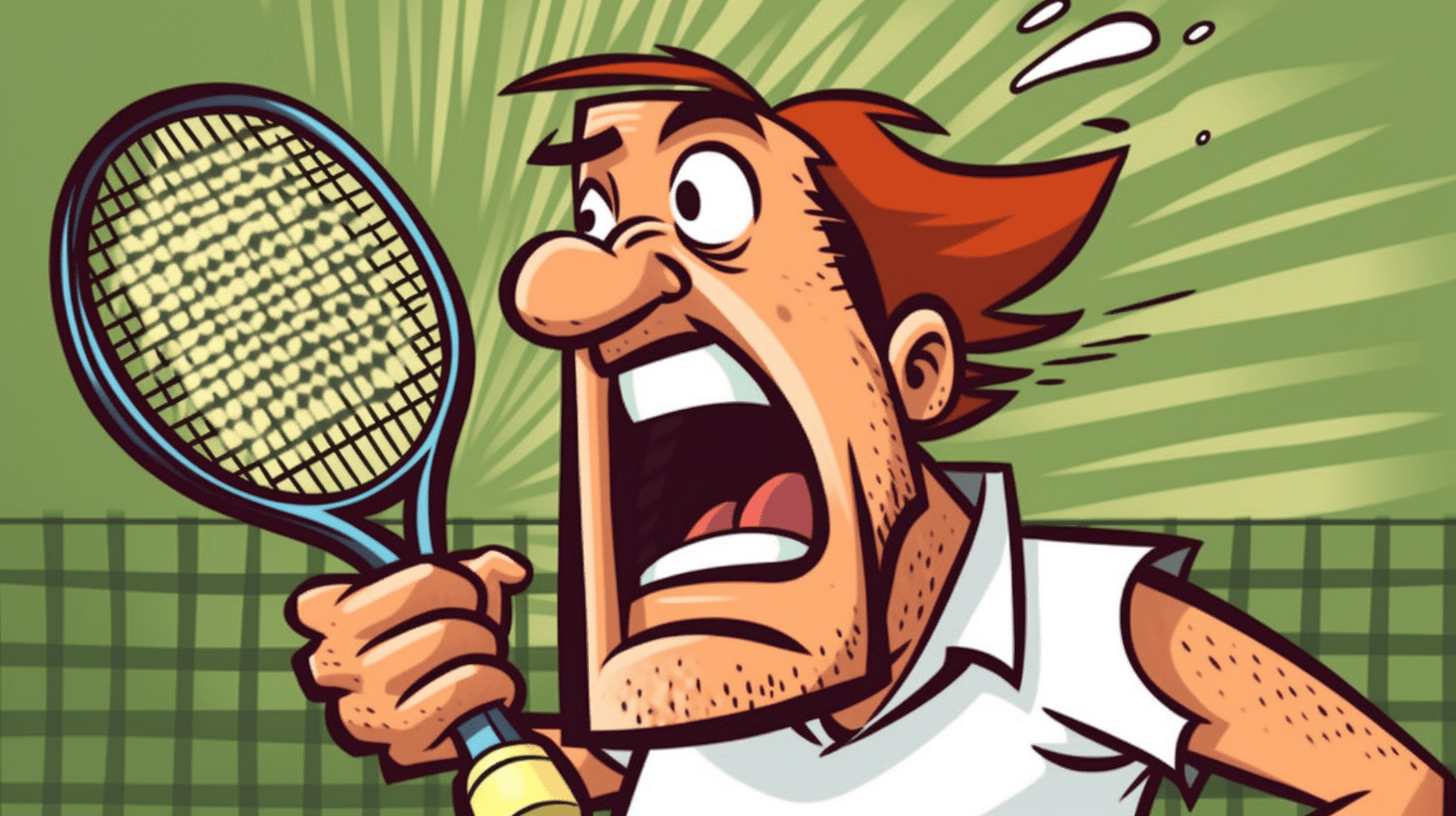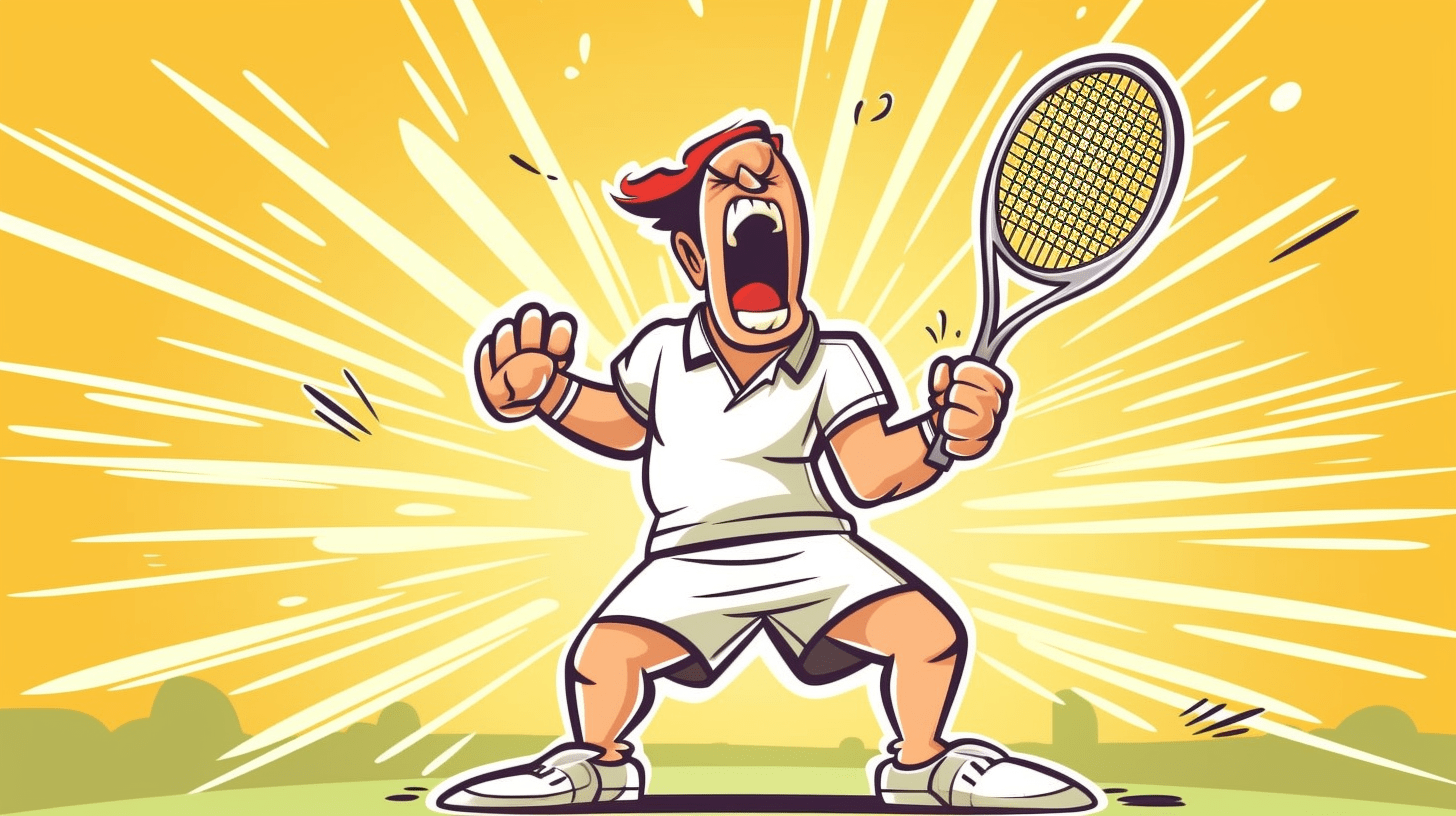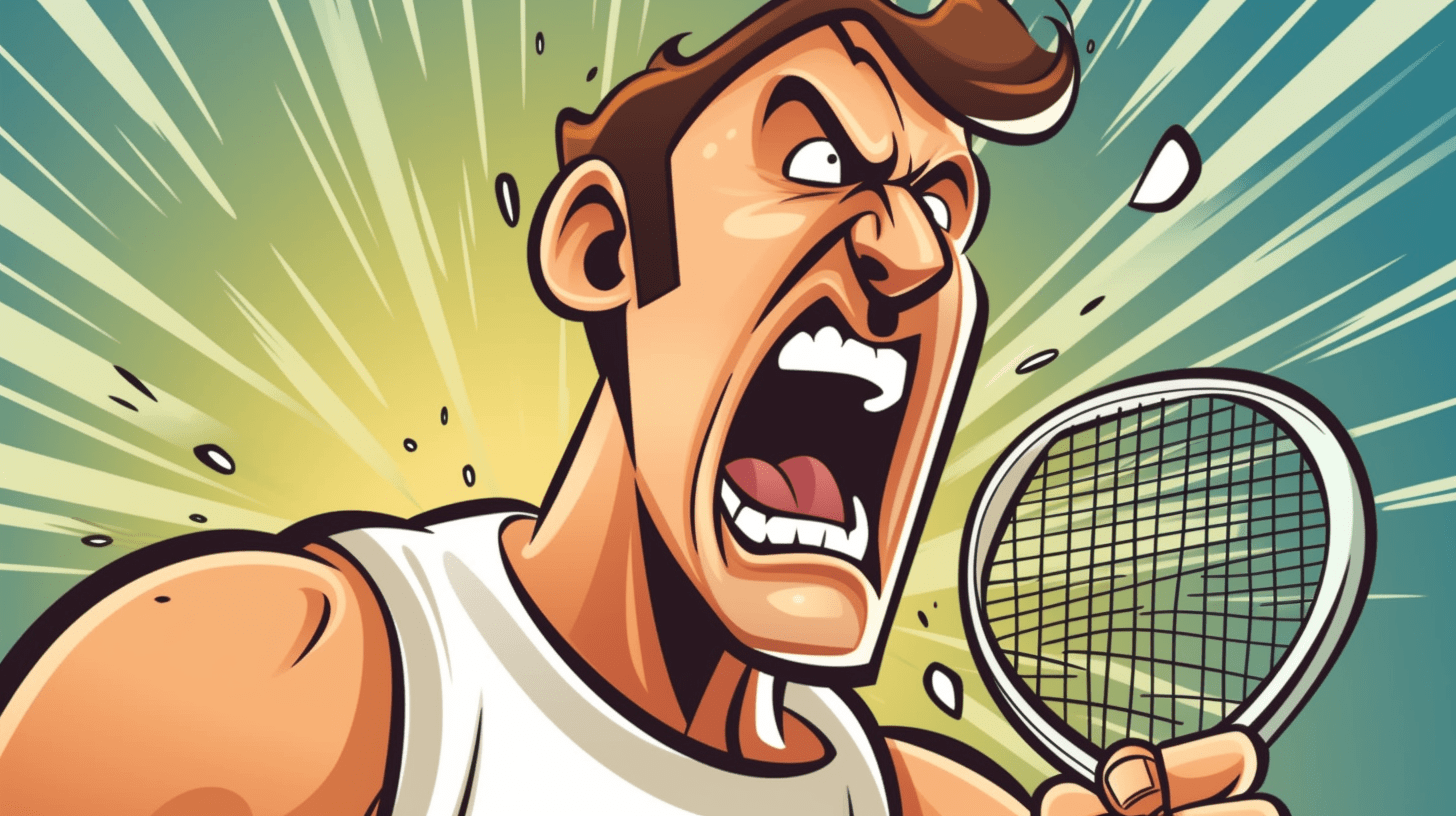Introduction
Ever wondered why tennis players grunt while playing?
Tennis grunting has been a topic of debate for years, with famous players like Maria Sharapova, Serena Williams, and Rafael Nadal being known for their distinct sounds.
This article will discuss the reasons behind tennis players grunting, its effects on the game, and whether it is a strategy or a natural byproduct of competitive play.

The Science Behind Grunting
Physiology of Grunting
Tennis players grunt primarily due to the exertion involved in hitting the ball. As players swing their racquets, they engage their core muscles, which force air out of the lungs and result in a grunt.
This phenomenon is similar to weightlifters grunting when lifting heavy weights. The grunt creators, such as Maria Sharapova and the Williams sisters, often have powerful groundstrokes, which could explain the need for more exertion and subsequently louder grunts.
The Role of Grunting in Tennis Performance
Research suggests that tennis grunting may have performance-enhancing effects. Grunting can help generate more power in a shot, leading to a faster and more forceful ball trajectory.
Professional tennis players, like Novak Djokovic and Rafael Nadal, have attributed part of their success to their grunts.
A well-timed grunt can aid in shot preparation, improving a player’s focus and timing on the ball. Studies have shown that players who grunt have a slower response time when receiving the ball, indicating that the noise could serve as an auditory cue for the moment of impact.
This cue can be particularly useful for players who started playing tennis at a young age, as they may have developed the habit of grunting in conjunction with their strokes.

Psychological Effects of Grunting
Intimidation and Distraction
Some tennis players may use grunting as a tactic to intimidate or distract their opponents. A loud grunt can disrupt an experienced opponent’s focus, leading to slower response times and increased error rates.
Grunting can be particularly effective when an opponent is trying to determine the direction of the ball, as the noise may mask the sound of the ball leaving the grunter’s racquet.
Tennis history is filled with examples of players who used their grunts to throw off their opponents.
Former player and coach Nick Bollettieri, who personally trained many loud grunters at his Bollettieri Academy, has been publicly accused of teaching grunting as a tactic to gain an advantage in competitive play.
Caroline Wozniacki (then world no. 1) publicly accused Bollettieri’s students of cheating by grunting.
Bollettieri’s academy later issued a document calling grunting “unsportsmanlike” and acknowledging that it obscures the sound of string impact, resulting in an increase in an opponent’s decision error, and a slower response time.
Self-Motivation and Confidence
Grunting can also serve as a form of self-motivation for tennis players. The sound of their grunt may boost their confidence and help them stay focused on the game.
Sports psychologists have found that grunting can help release tension and provide a sense of catharsis, allowing players to channel their emotions effectively.
Video clips of Monica Seles and Serena Williams, two of the loudest grunters in the history of tennis, show them using their grunts to maintain focus and intensity during crucial points in their matches.
These examples suggest that grunting could play an essential role in a player’s mental game.

Grunting Controversy and Etiquette
The debate around grunting in tennis has led to a divided tennis community. While some argue that grunting is a natural part of the sport, others believe it’s a deliberate tactic used to gain an unfair advantage.
Fans and commentators often have mixed feelings about grunting. Some enjoy the intensity it brings to the game, while others argue that it detracts from the sport’s elegance and can be disrespectful to opponents and spectators.
There have even been instances of coaches deliberately teaching grunting as a tactic, further fueling the controversy.
Opponent’s Perspective
From an opponent’s perspective, a tennis player’s grunt can be distracting or even annoying. Many tennis players have expressed their frustration with the grunting of their opponents, feeling it negatively impacts their performance.
Loud noise from a tennis grunt can make it difficult for players to concentrate on the game and react to their opponent’s shots. Additionally, an opponent’s decision error could increase when facing a particularly loud grunter, as the grunting might interfere with their ability to anticipate the ball’s direction and speed.
The Tennis Community’s Views
The tennis community has diverse opinions on grunting. Some fans and commentators appreciate the intensity that grunting brings to the game, seeing it as an authentic expression of effort and emotion.
However, others argue that it’s disrespectful to both opponents and spectators, detracting from the elegance of the sport.
The discussion around grunting has sparked debates around sportsmanship, with people questioning whether players should be allowed to use such tactics in professional tennis.

Rules and Regulations
WTA and ATP Guidelines
Both the Women’s Tennis Association (WTA) and the Association of Tennis Professionals (ATP) have guidelines addressing excessive grunting.
While there is no specific rule against grunting, umpires can issue warnings for unsportsmanlike conduct if they believe it’s excessive or disruptive.
In some cases, the Grand Slam supervisor can be called to assess the situation and determine whether further action is necessary.
Notable Incidents and Penalties
Several incidents involving grunting in professional tennis have made headlines over the years. One of the most famous cases occurred in 2012, when Victoria Azarenka faced criticism for her loud grunts during the Australian Open.
Many players and commentators called for action to be taken against her, leading to discussions about regulating grunting in the sport.
Another incident took place at the Queen’s Club Championships in 2018, when David Nalbandian received a warning for excessive grunting during a match.
This event sparked debate around whether men’s games should be subject to the same scrutiny as women’s when it comes to grunting, as it has typically been more associated with female tennis players.
These notable incidents highlight the ongoing controversy surrounding grunting in tennis, with many calling for clearer guidelines and enforcement to ensure a fair and enjoyable playing environment for all.
Techniques to Control Grunting
Breathing Techniques
Players looking to control their grunting can focus on proper breathing techniques. Exhaling during impact and inhaling during recovery can help minimize or even eliminate grunting.
By consciously regulating their breath, tennis players can better manage the volume and frequency of their grunts, potentially reducing any negative effects on their opponents.
Mental Training
Mental training, such as mindfulness and visualization, can help players stay focused and in control during matches. By remaining calm and composed, they can better regulate their grunting and avoid potential distractions or penalties.
Sports psychologists often work with professional players to develop strategies for managing emotions, maintaining concentration, and staying in the present moment. These techniques can help tennis players reduce their reliance on grunting as a means of coping with stress or channeling their energy.
Conclusion
In conclusion, tennis grunting is a complex issue with both physiological and psychological factors at play. While it can enhance performance and serve as a form of self-motivation, it can also be seen as a disruptive and unsportsmanlike tactic.
The ongoing debate surrounding grunting in tennis highlights the need for clearer guidelines and enforcement, as well as the importance of players developing techniques to control their grunting for the sake of fair play and sportsmanship.
FAQs
- Why do tennis players grunt?
Tennis players grunt primarily due to the exertion involved in hitting the ball. Grunting can also have performance-enhancing effects and serve as a form of self-motivation or intimidation.
- Is grunting in tennis allowed?
While there is no specific rule against grunting, both the WTA and ATP have guidelines addressing excessive grunting. Umpires can issue warnings for unsportsmanlike conduct if they believe grunting is excessive or disruptive.
- How can tennis players stop grunting?
Players can control their grunting through proper breathing techniques and mental training, such as mindfulness and visualization.
- Do all professional tennis players grunt?
No, not all professional tennis players grunt. Grunting varies from player to player and can be more pronounced in those with powerful groundstrokes or a history of grunting from a young age.
- Has any professional tennis player ever been penalized for grunting?
While penalties for grunting are rare, there have been instances where players have received warnings for excessive grunting, such as David Nalbandian at the 2018 Queen’s Club Championships.





